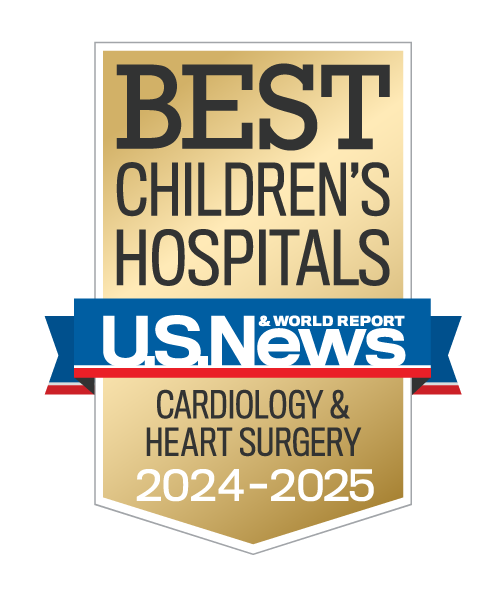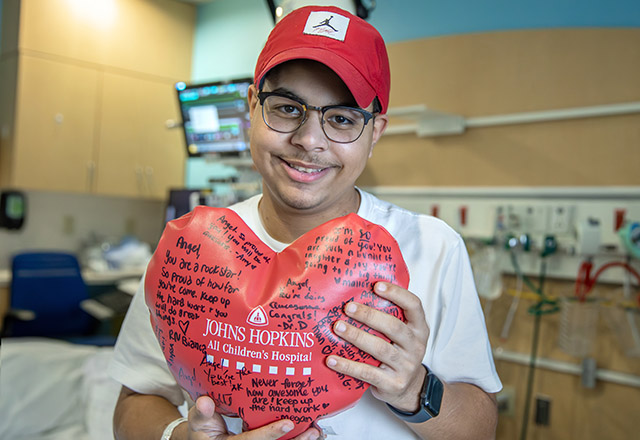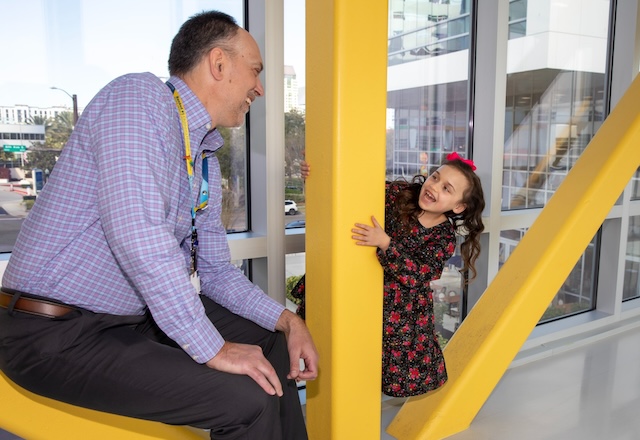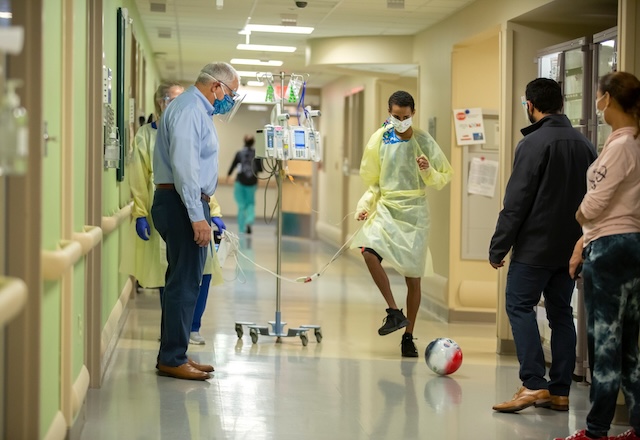Recognized as a Top 50 Cardiology and Heart Surgery Program by U.S. News & World Report 2024-2025
When a heart transplant offers the best hope for a child with a life-threatening heart problem, our team has the experience to help. The heart transplant team at Johns Hopkins All Children’s Hospital in St. Petersburg, Florida, includes cardiothoracic surgeons, pediatric cardiologists, cardiac intensivists, advanced practice providers, transplant coordinators, social workers, pharmacists, dietitians and others who provide comprehensive heart transplant care.
Why Choose Johns Hopkins All Children’s

Our pediatric heart transplant program has performed more than 190 neonatal and pediatric heart transplants for patients with congenital heart defects or acquired heart disease.
Our expert team can provide a range of cardiovascular support services, including full mechanical support of the heart with extracorporeal membrane oxygenation (ECMO) and ventricular assist devices (VAD). We are designated as an ECMO center of excellence by the Extracorporeal Life Support Organization (ELSO), and we were the first pediatric center in Florida to use a ventricular assist device (VAD).
Some patients in need of a transplant may have a high sensitivity to human leukocyte antigens (HLA), which are the proteins in the body that the immune system uses to identify which cells belong to the body and which do not. A higher degree of sensitivity can increase the risk of complications such as the body rejecting the transplant. We measure patients’ HLA sensitivity before transplant so that we can properly manage post-transplant care for these patients.
We also perform ABO blood group-mismatched transplants for patients under 2 years of age, who may receive a new heart from a donor of any blood type.
Our heart transplant program is approved by the United Network for Organ Sharing (UNOS), and our transplant team members participate in the Pediatric Heart Transplant Society, the ACTION Learning Network, and the International Society for Heart and Lung Transplantation.
Ongoing patient and family education and support in the post-transplant years is an important part of your child’s care, to help him or her lead an active and fulfilling life and prepare for the journey into adulthood. Because we know your child’s unique medical and cardiac history, we continue to provide post-transplant cardiology and adult congenital heart disease services into adulthood.
Why a Pediatric Heart Transplant?
Some children are born with congenital heart defects that can't be corrected by surgery, while other patients may develop life-threatening cardiomyopathy, a disease of the heart muscle. A heart transplant replaces the patient's diseased heart with a healthy donor heart.
Our team of pediatric heart surgeons and cardiologists specializes in treating complex cardiac problems. Children are eligible for a heart transplant if they have a heart problem that cannot be treated otherwise with medical or surgical care. If a heart transplant is the only option for your child, our team is here to support you through this lifesaving process.
Our center is also a Children’s Cardiomyopathy Foundation Recognized Center of Care. The Children’s Cardiomyopathy Foundation’s Cardiomyopathy Centers of Care Program recognizes medical centers with expertise in pediatric cardiomyopathy. A hospital that is a recognized Center of Care provides high-quality cardiac care and specialized disease management to children with cardiomyopathy.
What to Expect Before and After Heart Transplant
Before Heart Transplant
Your child will receive an evaluation by our care team to explore all medical and surgical treatment options, including heart transplant. We will perform diagnostic procedures that may include cardiac catheterization, heart biopsies, CT scans and cardiac MRI. We also will evaluate your child's overall health and immune system.
If the evaluation shows that heart transplant is the best option, your child will be placed on the waiting list with the United Network for Organ Sharing (UNOS), which matches donor organs with children and adults in the United States who need a transplant. Some children can be at home while waiting for a transplant. Others stay in our cardiovascular intensive care unit (CVICU) and are cared for by the experts on our heart transplant and heart failure team until a donor heart becomes available.
Waiting Process
Once your child is placed on the donor waiting list, the wait may be a few days to several months. Several factors are considered when matching a donor heart to a patient, and it is impossible to know how long a person may wait before being matched.
While your child is on the heart transplant list, our heart transplant coordinators will stay in touch with you between outpatient visits to provide updates, such as any changes in your child’s waiting list status or changes in their follow-up schedule. Your child will be seen for outpatient visits as needed depending on his or her condition, and may require additional treatments to support his or her heart while awaiting heart transplant. These treatments could include anticoagulants, intravenous medications or mechanical circulatory support (ventricular assist devices), etc.
The heart transplant surgeon and/or transplant cardiologist will be notified if a donor heart becomes available for your child. They will decide if additional information or tests are needed on the donor heart and determine if the heart is suitable for your child.
The heart transplant coordinator will contact you when a donor heart becomes available for your child. The coordinator will inform you of next steps, which could include remaining at home to preparing to come to the hospital, or you could be asked to come to the hospital as soon as possible.
While every effort is made to determine as early in the process as possible whether the donor heart is suitable for your child, it is possible that the transplant team may ultimately determine the available heart is not suitable. We understand this can be very disappointing for a family; however, our team is committed to providing our patients with the highest standard of care and will not proceed with a transplant if the donor heart is not the optimal heart for your child.
What to Expect After Transplant Surgery
First few days after heart transplantation
Immediately after surgery, your child will be transferred from the operating room to the cardiovascular intensive care unit (CVICU) to receive further care. The CVICU team includes pediatric cardiologists, heart surgeons, cardiac critical care physicians, respiratory therapists and other pediatric experts who care for our patients after surgery. In the CVICU, your child will recover from the surgery and begin treatment with any needed medications to prevent rejection of the donor heart. Your child will most likely remain in bed and will be able to eat or drink by mouth in the first few days after the transplant.
Preparing for Discharge from the Hospital
Most of our patients are able to leave the hospital within four weeks after transplant. Our team helps your child and family become comfortable and confident with the medications and self-care that are needed after a heart transplant.
Several days before your child is discharged, we will review your child’s medications with you, including dosage amounts, a schedule for giving the medications, and how to keep track of the medications after leaving the hospital. Prescriptions for your child’s medications may be filled by the Johns Hopkins All Children’s Retail Pharmacy or your local outside retail pharmacy a few days before discharge. This will provide you enough time to practice measuring doses and to become comfortable with giving your child his or her medications before leaving the hospital.
We will review complete information about your child’s follow-up visits and any signs of possible issues your child may experience after transplant that you should be aware of before discharge. The immediate risks of transplantation include rejection, infection the risks associated with open-heart surgery, and may be increased based on your child's clinical condition before heart transplant.
Follow-Up Care After Heart Transplant
The transplant coordinators arrange follow-up clinic visits, lab work, echocardiograms, and heart catheterization with biopsies, as well as assist with other needs. We can also help coordinate temporary homeschooling for your child after you return home. In addition to coordinating your child’s medications, we also help our patient’s primary care physicians understand the special healthcare needs of post-transplant patients to ensure continuity of care.
Outpatient visits at Johns Hopkins All Children’s Hospital take place very frequently during the first year, and then gradually transition to just a few visits per year. The goal is for our transplant patients to become healthy and independent adults.
Heart Transplant Follow-Up Clinic Location
We provide outpatient care in our Transplant Follow-up Clinics in the Outpatient Care Center located across the street from the main hospital on the St. Petersburg campus. Between clinic visits, lab testing and other diagnostic tests may be performed at several of our Outpatient Care locations.
Maya's Story
With expert, compassionate care from the Heart Institute team at Johns Hopkins All Children’s, Maya was up and moving shortly after surgery for a heart transplant, never losing her big smile and spirited personality.
Explore Learn more about our program.
-
Meet Our Transplant Team
Meet the heart transplant specialists providing care to our patients.

-
Patient and Family Support
Learn more about how we work to support your child and family during all stages of your child’s treatment.

Contact Us and Second Opinions
For more information or to make an appointment, please give us a call at the phone number below. We serve families in the greater Tampa Bay area and beyond.
Give us a call
Get a second opinion
A second opinion from our experts can help you better understand your child's treatment options. Request second opinion.
Read inspiring stories about our patients.
-
From Critical Aortic Stenosis to a New Heart: Angel's Story
As family and staff cheer, Angel hangs his name on a special wall in the Heart Center. Learn about Angel’s journey to celebrating a new heart.

-
Heart Transplant: Maya’s Story
With expert, compassionate care from the Heart Institute team at Johns Hopkins All Children’s, Maya was up and moving shortly after surgery for a heart transplant, never losing her big smile and spirited personality.

-
From the Hospital Halls to the Varsity Soccer Field
A little more than a year after needing a heart transplant, 15-year-old Wilfre is back on the soccer field.



